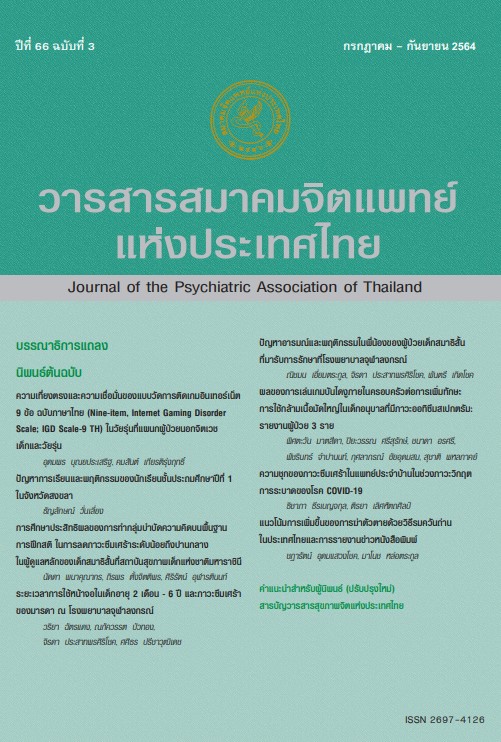Validity and Reliability of the Thai Internet Gaming Disorder Scale 9-item (IGD Scale-9 TH) in adolescents in the psychiatry out-patient unit
Main Article Content
Abstract
Objective: To evaluate the validity and reliability of the Thai version of the Internet Gaming Disorder Scale (Short version) (IGD Scale-9 TH) for the screening and diagnosing internet gaming disorder according to DSM-5 and ICD-11 criteria in adolescents between 11 to 17 years of age.
Method: The original IGD Scale-9 was translated into Thai and translated back to English by an professional translator. 90 pairs of adolescents and parents, who received treatment at child and adolescent psychiatric outpatient unit, were complete a demographic questionnaire along with adolescents completing the IGD Scale-9 TH. After that, the pairs were interviewed by child and adolescent psychiatrist or resident with a semi-structure interview to confirm the diagnosis of internet gaming disorder in the adolescents. Statistical analysis were used to find Inter-rater reliability, internal consistency, reliability and validity of the questionnaire.
Results: The questionnaire has good internal consistency (Cronbach’s alpha = 0.69). The interview has very good inter-rater reliability (Cohen’s kappa = 1). The IGD Scale-9 TH when comparing to DSM-5 diagnosis criteria at the cut off equal to 5 was found to have a sensitivity = 0.69, specificity = 0.91, positive predictive value (PPV) = 82.8, negative predictive value (NPV) = 82.0 and area under curve (AUC) = 0.86. The questionnaire when comparing to ICD-11 diagnosis criteria at the cut off equal to 4 was found to have a sensitivity = 0.50, specificity = 0.98, PPV = 50.0, NPV = 97.6 and AUC = 0.92.
Conclusion: The IGD Scale-9 TH was found to have good reliability and validity, can serve as a good screening and diagnosing tool for internet gaming disorder in Thai adolescents aged, especially in clinical setting.
Keywords: internet gaming disorder, screening, questionnaire, reliability, validity
Article Details
Articles submitted for consideration must not have been previously published or accepted for publication in any other journal, and must not be under review by any other journal.
References
National Statistical Office Thailand. The information and communication technology survey on household. Bangkok, 2017.
Electronic Transactions Development Agency. Thailand Internet User Profile 2018. Bangkok, 2018.
Colwell J, Payne J. Negative correlates of computer game play in adolescents. Br J Psychol. 2000; 91 ( Pt 3): 295-310.
Griffiths MD, Hunt N. Dependence on computer games by adolescents. Psychol Rep. 1998; 82(2): 475-480.
Mihara S, Higuchi S. Cross-sectional and longitudinal epidemiological studies of Internet gaming disorder: A systematic review of the literature. Psychiatry Clin Neurosci. 2017; 71(7): 425-444.
Hongsanguansri S, Silpakit C, Ruangkanchanasetr S. The Development of Problem Video Game Playing (PVP) Questionnaire, Thai version. J Psychiatr Assoc Thailand. 2006; 51(4): 315-329.
Pornnoppadol C, Sornpaisarn B, Khamklieng K, Pattana-amorn S. The Development of Game Addiction Screening Test (GAST). J Psychiatr Assoc Thailand. 2014; 59(1): 3-14.
American Psychiatric Association. Diagnostic and Statistical Manual of Mental Disorders. Fifth ed. Arlington, VA: American Psychiatric Publishing; 2013.
Lindmeier C. WHO releases new International Classification of Diseases (ICD-11): World Health Organization; 2018. [Cited….] Available from: https://www.who.int/news-room/detail/18-06-2018-who-releases-new-international-classification-of-diseases-(icd-11.
World Health Organization. Gaming disorder 2018. [Cited….] [Available from: https://www.who.int/features/qa/gaming-disorder/en/.
Jo YS, Bhang SY, Choi JS, Lee HK, Lee SY, Kweon YS. Clinical Characteristics of Diagnosis for Internet Gaming Disorder: Comparison of DSM-5 IGD and ICD-11 GD Diagnosis. J Clin Med. 2019; 8(7):945.
Lemmens JS, Valkenburg PM, Gentile DA. The Internet Gaming Disorder Scale. Psychol Assess. 2015; 27(2): 567-582.
Lemmens JS, Hendriks SJ. Addictive Online Games: Examining the Relationship Between Game Genres and Internet Gaming Disorder. Cyberpsychol Behav Soc Netw. 2016; 19(4): 270-276.
Cheng C, Li AY. Internet addiction prevalence and quality of (real) life: a meta-analysis of 31 nations across seven world regions. Cyberpsychol Behav Soc Netw. 2014; 17(12): 755-760.
Wichstrom L, Stenseng F, Belsky J, von Soest T, Hygen BW. Symptoms of Internet Gaming Disorder in Youth: Predictors and Comorbidity. J Abnorm Child Psychol. 2019;47(1):71-83.
Das A, Sharma MK, Thamilselvan P, Marimuthu P. Technology Addiction among Treatment Seekers for Psychological Problems: Implication for Screening in Mental Health Setting. Indian J Psychol Med. 2017; 39(1): 21-7.
Na E, Choi I, Lee TH, Lee H, Rho MJ, Cho H, et al. The influence of game genre on Internet gaming disorder. J Behav Addict. 2017; 6(2)::1-8.
Ko CH, Lin HC, Lin PC, Yen JY. Validity, functional impairment and complications related to Internet gaming disorder in the DSM-5 and gaming disorder in the ICD-11. Aust N Z J Psychiatry. 2020; 54(7): 707-718.
Carbonell X. El DiagnÓstico De AdicciÓn a Videojuegos En El Dsm-5 Y La Cie-11: Retos Y Oportunidades Para ClÍnicos. Papeles del Psicólogo - Psychologist Papers. 2020; 41(2).
Paik SH, Cho H, Chun JW, Jeong JE, Kim DJ. Gaming Device Usage Patterns Predict Internet Gaming Disorder: Comparison across Different Gaming Device Usage Patterns. Int J Environ Res Public Health. 2017; 14(12): 1512.
Evren C, Dalbudak E, Topcu M, Kutlu N, Evren B. The psychometric properties of the Turkish version of the Internet Gaming Disorder Scale. Dusunen Adam: The Journal of Psychiatry and Neurological Sciences. 2017; 30::316-324.
Rodriguez MC, Maeda Y. Meta-analysis of coefficient alpha. Psychol Methods. 2006; 11(3): 306-322.
Helms JE, Henze KT, Sass TL, Mifsud VA. Treating Cronbach’s Alpha Reliability Coefficients as Data in Counseling Research. The Counseling Psychologist. 2006; 34(5): 630-660.
Ponterotto JG, Ruckdeschel DE. An overview of coefficient alpha and a reliability matrix for estimating adequacy of internal consistency coefficients with psychological research measures. Percept Mot Skills. 2007; 105(3 Pt 1): 997-1014.
Ho RC, Zhang MW, Tsang TY, Toh AH, Pan F, Lu Y, et al. The association between internet addiction and psychiatric co-morbidity: a meta-analysis. BMC Psychiatry. 2014;14: 183.
Przybylski AK, Weinstein N, Murayama K. Internet Gaming Disorder: Investigating the Clinical Relevance of a New Phenomenon. Am J Psychiatry. 2017; 174(3): 230-236.
Gentile DA, Bailey K, Bavelier D, Brockmyer JF, Cash H, Coyne SM, et al. Internet Gaming Disorder in Children and Adolescents. Pediatrics. 2017; 140(Suppl 2): S81-S5.


